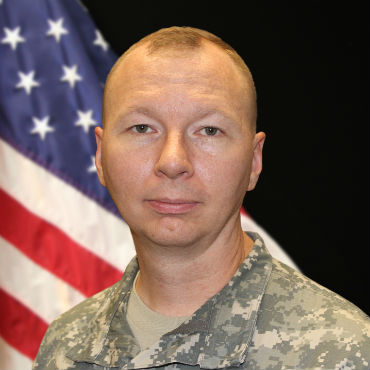Wi-Fi for soldiers almost a reality
Later this year the Army will be deploying Wi-Fi capability to its soldiers. Meet the man who made it happen.

Lt. Col. Joel Babbtit is leading the charge to bring Wi-Fi to the Army.
Later this year the Army plans to widely deploy Wi-Fi at command posts, a move officials say will make for much nimbler combat units. The program is a marriage of common wireless technology and military-grade encryption, and the man who made it happen is confident the network cannot be hacked.
"The encryption technology that's used on it is really good and has yet to be hacked," said Lt. Col. Joel Babbitt, who until last year was the product manager for the Army's Warfighter Information Network-Tactical (WIN-T) Increment 1.
WIN-T is the service's sprawling global communications network that enables the Wi-Fi. The Army tested WIN-T's wireless capability in May 2015 at Fort Bliss, Texas, and will be rolling it out to soldiers around the world this year, according to Babbitt.
For Babbitt, it's about time. "I mean, who doesn't have Wi-Fi in their house?" he said in a March 23 interview.
The Wi-Fi capability will reduce the time it takes to take down and set up Internet communications at a command post by three hours, according to Babbitt.
Babbitt spoke to FCW after delivering a presentation on acquisition to AFCEA's Fort Belvoir chapter. He has opinions aplenty on how to bypass potential dead-ends in the system.
"Yes, some of what I do has its detractors," Babbitt said, describing himself as not risk averse -- especially when compared to some other product managers.
His approach to acquisition might be summed up as starting with a capability that soldiers in the field need and finding the money for it, rather than vice versa. "I'm always looking for how to do stuff within the rules but without the structure that slows it down."
One way to avoid a program becoming ensnared in bureaucracy, Babbitt said, is to steer clear of an Acquisition Category I (ACAT) designation, which requires extensive review by the Pentagon. "It may look great on your résumé, but it causes a lot of delays," he said of an ACAT designation.
Before his stint with WIN-T Increment 1, Babbitt was an acquisition official at Joint Special Operations Command, whose special forces often need high-tech gear on the fly.
"You have no idea the sheer culture shock I went through," Babbitt said of the transition from the fast-paced JSOC acquisition environment to WIN-T Increment 1.
Babbitt is now product director for wideband enterprise satellite systems, in the Army's Program Executive Office for Enterprise Information Systems. He is looking to bend bureaucratic norms there, too.
Adopting commercial-off-the-shelf technologies will be crucial, he said. "What do we produce that's actually…strictly military technology in the satellite realm?" Babbitt added. "Nothing, except maybe some encryption devices."
Note: This article was updated on March 28 to make clear that Lt. Col. Babbitt was referring specifically to the Acquisition Category I designation.
NEXT STORY: Halvorsen not satisfied with data center savings





